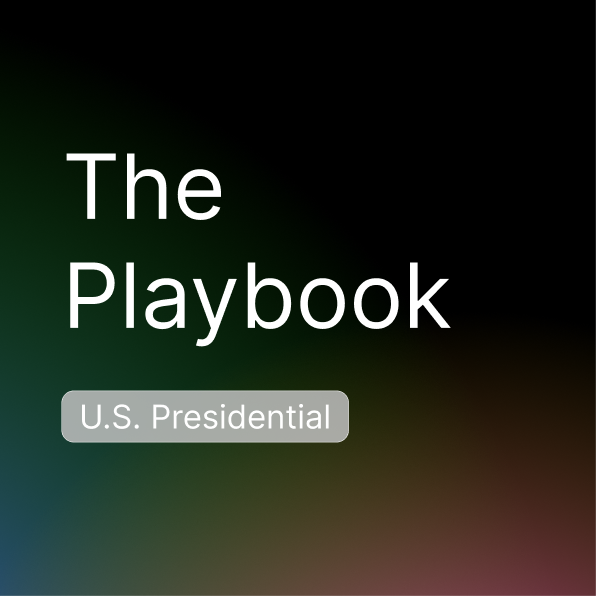The Playbook for Independents: Style or Policy?

Harris's Swing State Surge
To the surprise of many, almost every swing state now shows Harris either closing the gap or taking the lead. Here are the numbers as of August 30th:
- FL: Harris +0.75
- GA: Harris +4.5
- NC: Harris +3.12
- PA: Harris +2.17
- WI: Trump +2.37
- MI: Harris +3.75
- AZ: Harris +3.55
- NV: Harris +3.14
Convention Bump or Strategic Shift?
Typically, candidates get a bump during the convention—but is that all this is? Not exactly. You might wonder what happened to Trump’s momentum after the conviction and assassination attempt. Many were predicting a Trump blowout! But to put it bluntly, the Democrats squashed it. They either played their cards right or stumbled into the lead. I'll leave that for you to decide.
To understand where Harris’s lead came from, we must first look at Biden. Three key issues turned off moderate and independent voters:
- President Biden's Age: No matter how you analyze policies, Biden’s age was a problem the Democrats couldn’t solve. It’s not just about a candidate’s age but how they present themselves—how they look, move, and speak. In 1984, the Democrats tried to make Reagan’s age an issue, but Reagan didn’t come across as “elderly.”
- Inflation and the Economy: Democrats will argue that this is perceived inflation or a lingering impact from COVID, while Republicans will pin it directly on Bidenomics. But here’s the thing: whether it's perceived or real doesn’t matter. What matters is what voters believe to be real—and they’re definitely feeling the pinch. This isn’t just a concern for independents; it's the top issue for voters across the board in every swing state.
- Immigration and Border Security: This is another area where Biden’s performance fell short, leaving moderates and independents frustrated with how he’s handled the border crisis. It's not just a minor issue—it's the second-highest concern among independents and voters in general across the swing states.
This left moderates and independents with two reluctant options: Trump or RFK...
Moderates and independents split into two camps. The first could overlook Trump’s rhetoric and focus on policy, thinking, “My life was economically better under Trump, and he’s the border wall guy, right?” The second couldn’t get past Trump’s rhetoric and opted for RFK as a protest vote. By the end of July, a game-changer appeared: Biden dropped out, and Kamala Harris, a new, younger “moderate” candidate, entered the race.
Suddenly, independents and moderates weren’t stuck choosing between two evils; they had a solution! Harris brought fresh energy to the election. The Democrats now had a younger and more vibrant candidate. Worse for the Republicans, Trump became the “old guy.” What was projected to be one of the lowest turnouts in presidential history might now become one of the highest.
The Framing Battle
Republicans might argue, “Harris isn’t a moderate! She was voted one of the most liberal senators by "GovTrack.” But that doesn’t matter to the average voter. Political insiders follow politics year-round, but the average voter tunes in for just a few months every four years. It’s not the actual events that sway voters; it’s how those events are framed and the message attached to them. The Democrats nailed that framing, positioning Harris as a savior—a moderate who solved voters’ biggest dilemma: voting for a “geriatric white man” or the “evil orange guy.” This quickly swayed independents, moderates, and women toward Harris, allowing her to gain ground on Trump. Another boost came from Harris’s VP pick, Tim Walz, and the convention provided additional momentum. But will it last? Maybe, but probably not.
While the Harris campaign can convince Democrats she’s a moderate, it’s tougher to sell that to independents once they dig into her history and policy positions. Independents haven’t even realized it’s still the Biden/Harris administration, and Harris won’t have a good argument for the state of the economy (perceived or real) without throwing Biden under the bus.
So, Harris has only one real option to maintain her lead: a basement campaign. Republicans will yell “commie liberal,” Democrats will yell “moderate!”—but who cares? She’s already secured her base and isn’t targeting the Republican base. She’s after the independents, and they won’t be swayed unless Harris herself does something to change their minds. Essentially, she’s her own worst enemy. Don’t do interviews, don’t debate, don’t put any policy out there—just do nothing. Republicans will focus on policy because that’s Harris’s weak point, while Democrats will emphasize style because that’s Trump’s weak point. Let Trump do the work for you! Let Trump damage himself in the eyes of moderates and independents. He can’t help himself, and worse, he can’t stay on message. It’s hard to make the race about policy when you can’t stick to a policy message (inflation, the economy, immigration, and border security). Remember, there's a reason Biden implemented this strategy in 2020... and it's because it works perfectly against Trump.
The Road Ahead
If Harris sticks to this strategy, she’s on a strong path to victory. Will this happen? Probably not. It’s human nature to let ego take over. We’re already seeing this in real-time, with Harris’s numbers slipping back into a competitive race after releasing her economic policy with price controls and flirting with the idea of endorsing unrealized taxable gains. If Harris lets her ego take the reins, and if Trump manages to stay off message, independents might just find themselves back where they were in July.